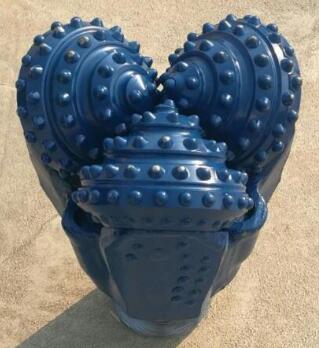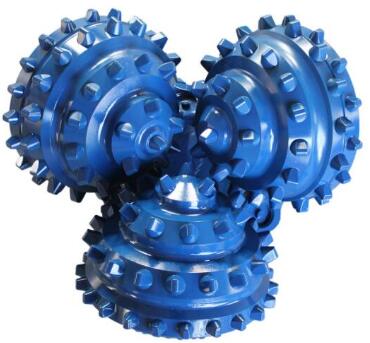Drilling Bit Types and Drilling Bit Selections
Currently in the drilling industry, there are two main categories of drilling bits: rolling cutter bits and fixed cutter bits. Plus, bit sizes vary from 3-7/8 inch to 36 inches.
Rolling Cutter Bits
Rolling cutter bits, which some may also call roller cone bits or tri-cone bits, have three cones. Each cone can be rotated individually when the drill string rotates the body of the bit. The cones have roller bearings fitted at the time of assembly. The rolling cutting bits can be used to drill any formations if the proper cutter, bearing, and nozzle are selected.
There are two types of rolling cutter bits which are milled-tooth bits and tungsten carbide inserts (insert bits). These bits are classified by how the teeth are manufactured:
1. Milled-tooth bits
Milled-tooth bits have steel tooth cutters, which are fabricated as parts of the bit cone. The bits cut or gouge formations out when they are being rotated. The teeth vary in size and shape, depending on the formation. Teeth of the bits are different depending on formations as follows:
Soft formation: The teeth should be long, slender and widely spaced. These teeth will produce freshly broken cuttings from soft formations.
Hard formation: The teeth should be short and closely spaced. These teeth will produce smaller, more rounded, crushed, and ground cuttings from hard formations.
2. Tungsten Carbide Insert (TCI) or Insert bits
Tungsten Carbide Insert (TCI) or Insert bits generally have tungsten carbide inserts (teeth) that are pressed into the bit cones. The inserts have several shapes such as long-extension shapes, round shaped inserts, etc. Teeth of the bits are different depending on the formation as follows:
Soft formation: Long-extension, chisel shape inserts
Hard formation: Short-extension, rounded inserts
Fixed Cutter Bits
Fixed cutter bits consist of bit bodies and cutting elements integrated with the bit bodies. The fixed cutter bits are designed to excavate holes by shearing formations rather than chippingor gouging formations, like rolling cutter bits. These bits do not have moving parts such as cones or bearings. The components of bits are composed of bit bodies fabricated from steel or tungsten carbide matrix and fixed blades integrated with abrasion-resistant cutters. The cutters in the bits that are available on the market are Polycrystalline Diamond Cutters (PDC) and natural or synthetic diamond cutters.
Nowadays, with the improvement that have been made in fixed cutter bit technology, the PDC bits can drill almost any kind of formations from soft to hard formation. However, if you plan to drill very hard formations, you might consider using diamond bits instead. If you need drilling bits for your upcoming project, please contact Grand. We have the equipment and experience needed to handle any project you have. We have the expertise to determine which type of drilling is best suited for the soil and geology of your project site.





